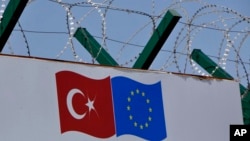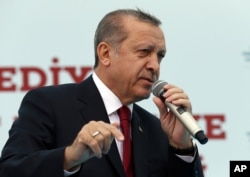Turkish President Recep Tayyip Erdogan delivered a tough message Friday to the European Union, telling supporters in a conservative Istanbul stronghold that though his country is facing terrorist attacks, reforming its anti-terror laws is out of the question.
Brussels is demanding the reform as one of five remaining conditions for Turkey to be eligible for visa-free travel to much of Europe, but Erdogan said he is not interested in such a deal.
“They say they are going to abolish visas and this is the condition,” Erdogan said. “I'm sorry, we're going our way, you go yours.”
Brussels claims that Turkey's anti-terror laws are far too broad. Erdogan, however, insists that with the country facing the twin threats of Kurdish rebels and Islamic State terrorism, the laws need to be expanded rather than curtailed.
Critics claim the anti-terror laws are being used increasingly against the president's critics and opponents of his government rather than terrorist groups. Hundreds of Turkish academics are being investigated under the country's anti-terrorism laws for signing a petition calling for an end to the military crackdown on Kurdish rebels and a resumption of peace talks. Four academics are already on trial.
On Friday, a Turkish court sentenced two prominent journalists, Can Dundar and Erdem Gul, for an article accusing the government of arms smuggling to Syrian rebels. Their sentencing is likely to add to EU concerns over human rights in Turkey.
Davutoglu's exit
Erdogan's tough stance on the anti-terror laws follows Thursday's resignation of Ahmet Davutoglu as prime minister. It has been widely reported that Erdogan forced Davutoglu to step down.
Davutoglu was the architect and main driving force behind Turkey's agreement with Brussels to take back migrants who entered Greece, in exchange for the EU permitting visa-free travel for Turkish citizens.
Despite Davutoglu's political demise, Turkish political scientist Cengiz Aktar says the EU will most likely try to accommodate Erdogan.
"Europe — and especially [German] Chancellor [Angela] Merkel — was more than happy to work with Mr. Recep Tayyip Erdogan, the president of the republic of Turkey. So they will continue like before to work with him directly," Aktar predicted.
Analysts say that the EU's collaboration with Turkey is proving extremely valuable to Brussels. Since its agreement with Ankara, the number of migrants entering Greece from Turkey has plummeted from thousands a day to around 100.
But Ankara has warned the EU that if it fails to deliver on visa-free travel, the agreement will be canceled. Observers say Friday's warning by Erdogan indicates he is well aware of the power he holds over the EU, and that he will not hesitate to use it.





